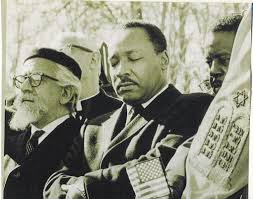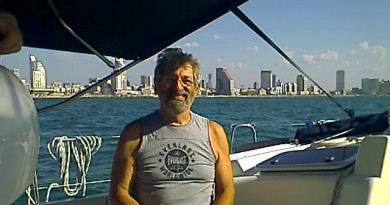R. Abraham Joshua Heschel, z”l
Today, the 18th of Tevet on the Jewish calendar, is the yartzeit (anniversary of the death) of Rabbi Abraham Joshua Heschel, who passed away in 1972.
If you have not read any of Heschel’s works, you should stop right now, and go to Amazon and buy two books: God in Search of Man, and The Sabbath. It doesn’t matter if you are Jewish, Christian, Muslim, whatever. Those two books have the power to change what you believe. And how you believe.
It is incredibly appropriate that Rabbi Heschel’s yartzeit falls during the week that we are reading parshat Shemot, the beginning of the book of Exodus. Shemot is the beginning of the story of Moses and the Exodus. Heschel was a rabbi who had a lot in common with Moses. As we know from the story of Moses, Moses was a mystic — he spoke directly to God; Moses was “the lawgiver,” compelling his people to act righteously; Moses was an activist, not just a speaker, as he personally marched the people out of Egypt. Heschel was, very fittingly, professor of ethics and mysticism. at the Jewish Theological Seminary. Like Moses the mystic, he spoke to God, but not only that, he helped many of us figure out how we too could speak to God. Like Moses, he charged his people to behave ethically. His daughter Susanna has spoken about how Heschel would be unable to sleep at night because he was so upset over Vietnam. And like Moses, Heschel was an activist who marched — in his case, the march was in Selma, Alabama, with Rev. Martin Luther King, Jr.
There is a PBS segment where you can see some clips of interviews with the great rabbi.
Thanks to google desktop, I know I have 147 documents on my computer which mention Heschel. Clearly he has influenced my thinking and my theology in a profound way. Heschel had a great way of finding the dialectic in Jewish thought, the diverse poles, and bringing them together in an unexpected way that brings with it new insight. A few examples:
“God is in need of man for the attainment of His ends, and religion, as Jewish tradition understands it, is a way of serving these ends, of which we are in need, even though we may not be aware of them, ends which we must learn to feel the need of. Life is a partnership of God and man.”
God in need of man? There’s a radical idea. We think of God as being perfect and omnipotent; Heschel shares with us the idea from Kabbalah that God needs us as well.
“A Jew is asked to take a leap of action rather than a leap of thought. He is asked to do more than he understands in order to understand more than he does.”
This is Heschel’s explanation of the teaching in the Talmud about na’aseh v’nishmah, we will do and we will understand, putting doing, following God’s path, ahead of mere intellectual understanding. Completely the opposite of the way we usually think things work, understand first and then do. But I love the way he puts it: take a leap of action.
One of Heschel’s teachings that effected me the most was his teaching on awe or wonder. He said:
“As civilization advances, the sense of wonder declines. Such a decline is an alarming symptom of our state of mind. Mankind will not perish for want of information; but only for want of appreciation. The beginning of our happiness lies in the understanding that life without wonder is not worth living. What we lack is not a will to believe, but a will to wonder.”
Reading that paragraph was a profound experience for me. A real “lightbulb going off” epiphany. I had been approaching God all wrong. I had been thinking about God, wrestling with abstract intellectual concepts. Yet the path to faith is lined with wonder and awe, not words.
To feel awe or wonder, we need to create the space for awe. We need to create the time. Heschel’s book on the Sabbath is considered by many to be his finest work. Pure poetry, which can also help transform your understanding — your experience — of the holy day:
“He who wants to enter the holiness of the day must first lay down the profanity of clattering commerce, of being yoked to toil. He must go away from the screech of dissonant days, from the nervousness and fury of acquisitiveness and the betrayal in embezzling his own life. He must say farewell to manual work and learn to understand that the world has already been created and will survive without the help of man. Six days a week we wrestle with the world, wringing profit from the earth; on the Sabbath we especially care for the seed of eternity planted in the soul. The world has our hands, but our soul belongs to Someone Else. Six days a week we seek to dominate the world, on the seventh day we try to dominate the self…”
Heschel lived what he preached and taught. He marched in Selma, and when he marched there he said “I felt like my feet were praying.” I will close with yet another quote, one that reminds us that while Rabbi Heschel is gone, continuing his work–God’s work– is up to us:
“The world is in need of redemption, but the redemption must not be expected to happen as an act of sheer grace. Man’s task is to make the world worthy of redemption. His faith and his works are preaparations for ultimate redemption.”
May his memory be a blessing. I’m envious of my older colleagues who had the opportunity to study with him.
Rav Barry



I have both books. I read them when I was younger and I reread them to this day. They are invaluable.
hello
i work at the ministary of education in Israel, I work on racism and need the picture of Heshel and L.King’ can you send it in good resolution?
it is urgent
thak you
laurence